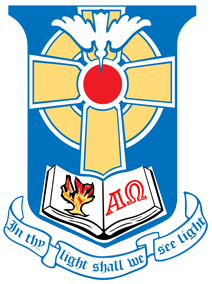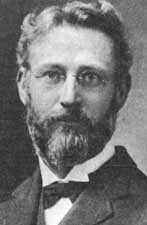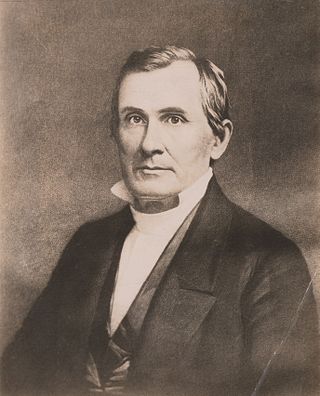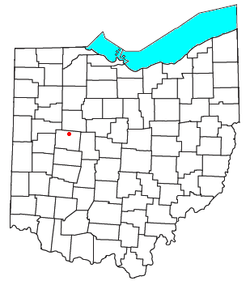
Geneva College is a private Christian college in Beaver Falls, Pennsylvania. Founded in 1848, in Northwood, Ohio, the college moved to its present location in 1880, where it continues to educate a student body of about 1400 traditional undergraduates in over 30 majors, as well as graduate students in a handful of master's programs. The only undergraduate institution affiliated with the Reformed Presbyterian Church of North America (RPCNA), the college's undergraduate core curriculum emphasizes the humanities and the formation of a Reformed Christian worldview.

Hanover is a town in Hanover Township, Jefferson County, southeast Indiana, along the Ohio River. The population was 3,546 at the 2010 census. Hanover is the home of Hanover College, a small Presbyterian liberal arts college. The tallest waterfall in Indiana, Fremont Falls, is located in Hanover.

The Presbyterian Church in America (PCA) is the second-largest Presbyterian church body, behind the Presbyterian Church (USA), and the largest conservative Calvinist denomination in the United States. The PCA is Reformed in theology and presbyterian in government.

Westminster Theological Seminary (WTS) is a Protestant theological seminary in the Reformed theological tradition in Glenside, Pennsylvania. It was founded by members of the faculty of Princeton Theological Seminary in 1929 after Princeton chose to take a liberal direction during the Fundamentalist–Modernist controversy.

The Associate Reformed Presbyterian Church (ARPC) is a theologically conservative denomination in North America. The ARPC was formed by the merger of the Associate Presbytery (seceder) with the Reformed Presbytery (covenanter) in 1782. It is one of the oldest conservative denominations in the United States.
Reformed Theological Seminary (RTS) is a theological seminary in the Reformed theological tradition with campuses in multiple locations in the United States. Founded by conservatives in the Southern Presbyterian Church, the Presbyterian Church in the United States, in 1966, it serves primarily students from more conservative branches of the Presbyterian and Reformed traditions.

Columbia Theological Seminary is a Presbyterian seminary in Decatur, Georgia. It is one of ten theological institutions affiliated with the Presbyterian Church (USA).

Pittsburgh Theological Seminary (PTS) is a Presbyterian graduate seminary in Pittsburgh, Pennsylvania. Founded in 1794, it houses one of the largest theological libraries in the tri-state area.
Ebenezer Erskine Pressly was the first president of Erskine Theological Seminary and Erskine College, beginning his service in 1838.

Geerhardus Johannes Vos was a Dutch-American Calvinist theologian and one of the most distinguished representatives of the Princeton Theology. He is sometimes called the father of Reformed Biblical theology.
Clarence Edward Noble McCartney was a prominent conservative Presbyterian pastor and author. With J. Gresham Machen, he was one of the main leaders of the conservatives during the Fundamentalist–Modernist Controversy in the Presbyterian Church in the United States of America.

Henry Wilson Temple was a Progressive and a Republican member of the U.S. House of Representatives from Pennsylvania.

The Reverend George Junkin was an American educator and Presbyterian minister who served as the first and third president of Lafayette College and later as president of Miami University and Washington College.

Old Main is an academic building on the campus of Geneva College in Beaver Falls, Pennsylvania, United States. The structure was also the first building constructed on the campus, after the college left its original location in Northwood, Ohio.

College Hill is a neighborhood located in the northern section of Beaver Falls, Pennsylvania, United States. Geneva College is located in the community, and is the namesake of College Hill.

Erasmus Darwin McMaster, D.D. was a nineteenth-century American Presbyterian pastor, academic and theologian who served as president of Hanover College and Miami University. Along with Henry Ward Beecher, McMaster was one of the most vocal Presbyterian anti-slavery advocates in Indiana.

Robert Park was an American college football coach. He was the tenth head football coach at Geneva College in Beaver Falls, Pennsylvania, serving for one season, in 1922, and compiling a record of 4–6. He also coached other sports for many years. He was best known for his work as an academic and a minister of the Reformed Presbyterian Church of North America (RPCNA).

Geneva Reformed Seminary is a small theological school in Greenville, South Carolina, accredited by the Association of Reformed Theological Seminaries and supported by the Free Presbyterian Church of North America. The seminary offers B.D. and M.Div. degrees. Initially called Whitefield College of the Bible after a companion school in Banbridge, Northern Ireland, the seminary was renamed in 2002 to avoid confusion in the United States where Bible schools and seminaries prepare students at different academic levels.
The Reformed Presbyterian Church in Taiwan was officially established in 1971 when the First Presbytery was formed as a result of the union of various conservative Presbyterian and Continental Reformed congregations planted by various missionary groups. Its origin could be traced back to the 1950s when the very first missionaries of those Presbyterian and Continental Reformed missionaries arrived in Taiwan.

Daniel Veech McLean was a Presbyterian minister and the fifth president of Lafayette College.


















